I'd never heard of 'The Other Woman' before I found it on Netflix, and I pretty much only watched it because I felt like seeing a movie set in New York City.
I certainly didn't choose 'The Other Woman' for its cast; neither Natalie Portman nor Lisa Kudrow would ever draw me to my local movie theater (or even to my Netflix queue) simply based on her presence. And I don't really have an opinion one way or the other about Lauren Ambrose or Anthony Rapp (the only other cast members in this film who I'm somewhat familiar with). Regardless, I thought that these actors were all effective, if not outstanding, in their roles. Portman in particular gives probably the strongest performance that I've seen from her (and, yes, I did see 'Black Swan').
'The Other Woman' is based on a book called "Love and Other Impossible Pursuits"; it centers on a young woman named Emilia (Portman) and her relationships with her 8-year-old stepson, her husband (who recently left his wife after a brief affair with Emilia), and the husband's (understandably) bitter ex-wife (Kudrow). There's also a story about Emilia and her husband's baby, who (at some point shortly before the story begins) died when she was just 3 days old; much of the film deals with Emilia's residual guilt. I haven't read the book, so I'm not sure how many things are different or similar in the movie version.
Anyhow, I'll admit that it was somewhat difficult to empathize with Emilia given the nature of how she met her husband and everything that followed. However, I don't think the point of 'The Other Woman' was necessarily to make viewers "sympathize" with Emilia rather than to show some of the effects of an affair -- as well as Emilia's personal struggles as "the other woman" (particularly her guilt over the death of her infant daughter, and her efforts to get along with her spoiled and often bratty stepson, William).
The film isn't for everybody -- and I didn't much care about a subplot involving Emilia's relationship with her parents -- but 'The Other Woman' was better than I expected, and might be worth checking out if you like quiet dramas, or movies that deal with familial relationships. (6/10)
Better than I expected
 Posted : 10 years, 3 months ago on 20 February 2015 11:56
(A review of The Other Woman)
Posted : 10 years, 3 months ago on 20 February 2015 11:56
(A review of The Other Woman) 0 comments, Reply to this entry
0 comments, Reply to this entry
Decent at best
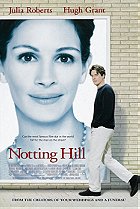 Posted : 10 years, 3 months ago on 20 February 2015 11:55
(A review of Notting Hill)
Posted : 10 years, 3 months ago on 20 February 2015 11:55
(A review of Notting Hill)Eh. I originally rated 'Notting Hill' with two-and-a-half-stars (5/10); but I've since docked a half-star because I didn't think 'Notting Hill' was all that great to begin with -- and it's one of those movies that, reflecting upon it afterward, I liked a little bit LESS, not more.
But for a Julia Roberts movie (most of the time, I don't care for those) 'Notting Hill' isn't TOO bad, either. I enjoyed the London setting, and (although I didn't "fall in love" with him) Hugh Grant is fine as the low-key, down-to-earth bookstore owner who just happens to meet and form a relationship with a famous movie star (Roberts) after she wanders into his shop one day.
Speaking of Roberts -- she's okay in her performance (I guess), but her character leaves a LOT to be desired! What exactly did "Will" see in "Anna"? (I'm sure she's supposed to be just stunning, but beyond her appearance?) Throughout the movie, Anna comes across as self-oriented, dishonest, inconsiderate, and barely tolerable. (If she'd been played as cutesy or "wacky", I would have absolutely loathed her.)
Still -- without giving away the ending (not that it would matter if I did, considering this movie is pushing 20 years old), I'll just say that it's a predictable one, and will probably satisfy any viewer who likes a "fairy tale" ending. (Personally, I thought the ending was rather dumb myself.)
Despite all of my gripes, I wasn't as bored by 'Notting Hill' as I expected to be. I doubt that I'll ever re-watch it, but (except for the stupid ending) it's a pleasant enough film -- in a Hollywood blockbuster (via London) sort of way. (4.5/10)
But for a Julia Roberts movie (most of the time, I don't care for those) 'Notting Hill' isn't TOO bad, either. I enjoyed the London setting, and (although I didn't "fall in love" with him) Hugh Grant is fine as the low-key, down-to-earth bookstore owner who just happens to meet and form a relationship with a famous movie star (Roberts) after she wanders into his shop one day.
Speaking of Roberts -- she's okay in her performance (I guess), but her character leaves a LOT to be desired! What exactly did "Will" see in "Anna"? (I'm sure she's supposed to be just stunning, but beyond her appearance?) Throughout the movie, Anna comes across as self-oriented, dishonest, inconsiderate, and barely tolerable. (If she'd been played as cutesy or "wacky", I would have absolutely loathed her.)
Still -- without giving away the ending (not that it would matter if I did, considering this movie is pushing 20 years old), I'll just say that it's a predictable one, and will probably satisfy any viewer who likes a "fairy tale" ending. (Personally, I thought the ending was rather dumb myself.)
Despite all of my gripes, I wasn't as bored by 'Notting Hill' as I expected to be. I doubt that I'll ever re-watch it, but (except for the stupid ending) it's a pleasant enough film -- in a Hollywood blockbuster (via London) sort of way. (4.5/10)
 0 comments, Reply to this entry
0 comments, Reply to this entry
Richard Jenkins is good
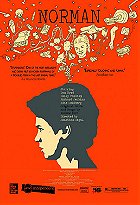 Posted : 10 years, 3 months ago on 20 February 2015 11:54
(A review of Norman)
Posted : 10 years, 3 months ago on 20 February 2015 11:54
(A review of Norman)'Norman' is one of those random independent movies that I'd never heard of, but decided to give a chance one day on Netflix because nothing else at the moment captured my interest.
To be honest, even though I chose to stream it, I went into 'Norman' somewhat reluctantly; I wasn't sure how I'd feel about the story of a high-school kid who "copes" with his father's terminal cancer by pretending to have cancer himself (!). Nevertheless, I was also mildly curious after reading the plot description (and intrigued that the movie was filmed in my home state -- granted, on the other side of Washington, over in Spokane).
The movie starts out well enough, and has some positive elements throughout. I enjoyed the score by Andrew Bird. Richard Jenkins gives a very good performance as Norman's terminally ill father; I also thought that Adam Goldberg's sympathetic teacher character was fairly interesting, and I wouldn't have minded seeing more of him.
Unfortunately, Dan Byrd's portrayal of the title character didn't really work for me; I found it difficult to empathize with his character during most of the movie (even though I could tell I was "supposed" to). This could have been at least partly due to the script -- or to Norman's irritating use of the video camera (which he's shown using in several scenes for a school assignment). Whatever the reason, I cared little enough for both Byrd's performance and his character that it kind of left a negative impact on my ability to appreciate the rest of the film. (However, Norman does somewhat redeem himself toward the end.)
Although Richard Jenkins's performance is certainly worth watching, I can't quite recommend this one overall. Unless perhaps you're familiar with Spokane, Washington and want to see it in the movies (none of the specific locations looked familiar to me in 'Norman', but people who have spent more time in the area might recognize some sights.) Or unless you're a big Andrew Bird fan and want to hear how he does as a film composer, while watching the actual film. (4/10)
To be honest, even though I chose to stream it, I went into 'Norman' somewhat reluctantly; I wasn't sure how I'd feel about the story of a high-school kid who "copes" with his father's terminal cancer by pretending to have cancer himself (!). Nevertheless, I was also mildly curious after reading the plot description (and intrigued that the movie was filmed in my home state -- granted, on the other side of Washington, over in Spokane).
The movie starts out well enough, and has some positive elements throughout. I enjoyed the score by Andrew Bird. Richard Jenkins gives a very good performance as Norman's terminally ill father; I also thought that Adam Goldberg's sympathetic teacher character was fairly interesting, and I wouldn't have minded seeing more of him.
Unfortunately, Dan Byrd's portrayal of the title character didn't really work for me; I found it difficult to empathize with his character during most of the movie (even though I could tell I was "supposed" to). This could have been at least partly due to the script -- or to Norman's irritating use of the video camera (which he's shown using in several scenes for a school assignment). Whatever the reason, I cared little enough for both Byrd's performance and his character that it kind of left a negative impact on my ability to appreciate the rest of the film. (However, Norman does somewhat redeem himself toward the end.)
Although Richard Jenkins's performance is certainly worth watching, I can't quite recommend this one overall. Unless perhaps you're familiar with Spokane, Washington and want to see it in the movies (none of the specific locations looked familiar to me in 'Norman', but people who have spent more time in the area might recognize some sights.) Or unless you're a big Andrew Bird fan and want to hear how he does as a film composer, while watching the actual film. (4/10)
 0 comments, Reply to this entry
0 comments, Reply to this entry
Not much to love
 Posted : 10 years, 3 months ago on 20 February 2015 11:52
(A review of New York, I Love You)
Posted : 10 years, 3 months ago on 20 February 2015 11:52
(A review of New York, I Love You)I love New York, too; but I can't say the same about 'New York, I Love You', an anthology of short films -- each one a sort of "love story" -- set in New York City.
Maybe the "love story" theme is part of the problem; while I don't automatically hate all movies classified as "love stories", it's rare that I think "rom-coms" (or other romance-oriented films) are better than average.
However, it isn't JUST the romance aspect that made me not care for this one; in 'New York, I Love You', the stories aren't all about romantic love. These stories simply aren't very interesting, and don't tie together very well as a whole.
The film stars an ensemble cast, and includes a handful actors I've enjoyed in other movies (Ethan Hawke, Andy Garcia, Robin Wright, Burt Young) as well as several actors who have never done much for me (and perhaps that "prejudice" influenced my opinion -- but let's just say that I thought the story with Orlando Bloom and Christina Ricci was one of the most boring ones).
Hawke is alright, though I didn't like his character much. Mostly, I just kept wondering why Hawke's voice sounded so bizarrely different (am I the only one who noticed this? I hadn't seen him in anything prior to this for awhile, so maybe his voice has sounded different for a long time.)
There ARE a few stories here that pass the time, and I did enjoy the setting, so I'll go ahead and give the film two stars (or 4/10).
But for a better movie anthology of short stories that celebrate New York (also starring an ensemble cast), check out 'Subway Stories: Tales from the Undergroud' -- which includes a couple of weaker stories itself, but in general is much more entertaining than 'New York, I Love You'.
Maybe the "love story" theme is part of the problem; while I don't automatically hate all movies classified as "love stories", it's rare that I think "rom-coms" (or other romance-oriented films) are better than average.
However, it isn't JUST the romance aspect that made me not care for this one; in 'New York, I Love You', the stories aren't all about romantic love. These stories simply aren't very interesting, and don't tie together very well as a whole.
The film stars an ensemble cast, and includes a handful actors I've enjoyed in other movies (Ethan Hawke, Andy Garcia, Robin Wright, Burt Young) as well as several actors who have never done much for me (and perhaps that "prejudice" influenced my opinion -- but let's just say that I thought the story with Orlando Bloom and Christina Ricci was one of the most boring ones).
Hawke is alright, though I didn't like his character much. Mostly, I just kept wondering why Hawke's voice sounded so bizarrely different (am I the only one who noticed this? I hadn't seen him in anything prior to this for awhile, so maybe his voice has sounded different for a long time.)
There ARE a few stories here that pass the time, and I did enjoy the setting, so I'll go ahead and give the film two stars (or 4/10).
But for a better movie anthology of short stories that celebrate New York (also starring an ensemble cast), check out 'Subway Stories: Tales from the Undergroud' -- which includes a couple of weaker stories itself, but in general is much more entertaining than 'New York, I Love You'.
 0 comments, Reply to this entry
0 comments, Reply to this entry
Spare me
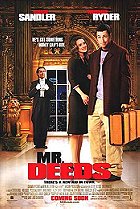 Posted : 10 years, 3 months ago on 20 February 2015 11:50
(A review of Mr. Deeds)
Posted : 10 years, 3 months ago on 20 February 2015 11:50
(A review of Mr. Deeds)'Mr. Deeds', the utterly ridiculous so-called "remake" of 'Mr. Deeds Goes to Town' (a movie that I haven't yet seen, but I'm guessing bears hardly any resemblance to this mess) is filled with childish, slapstick-y "humor", cartoon violence, and... little else. Of course, that kind of goes without saying, considering that Adam Sandler is the star of 'Mr. Deeds'. I only watched the stupid thing because most of the movie takes place in New York City (and I've been on a NYC kick as of late).
While I've never been a fan of Sandler's "comedy", I'll concede that he's a *smidge* more tolerable than some of his fellow "comic" actors who tend to appeal to a similar audience (i.e. Jim Carrey, David Spade). Which is about the nicest thing that I can say about Sandler's performance as the "simple", small-town-man-turned-billionaire, Longfellow Deeds.
Sandler's movies also tend to feature actors that I do enjoy watching; in the case of 'Mr. Deeds', the respectable supporting cast includes: John Turturro, Winona Ryder, Peter Gallagher, and frequent Sandler co-star Steve Buscemi (none of these actors give downright embarrassing performances, but all of them are far from at their best).
There's nothing else really worth mentioning about the movie -- other than that I especially hated the scene where stupid Longfellow "rescued" some cats from a burning apartment by throwing the poor things out the window (the "cats" were *very* obviously fake, but still!).
At least Adam Sandler doesn't try to be serious in it. (3/10)
While I've never been a fan of Sandler's "comedy", I'll concede that he's a *smidge* more tolerable than some of his fellow "comic" actors who tend to appeal to a similar audience (i.e. Jim Carrey, David Spade). Which is about the nicest thing that I can say about Sandler's performance as the "simple", small-town-man-turned-billionaire, Longfellow Deeds.
Sandler's movies also tend to feature actors that I do enjoy watching; in the case of 'Mr. Deeds', the respectable supporting cast includes: John Turturro, Winona Ryder, Peter Gallagher, and frequent Sandler co-star Steve Buscemi (none of these actors give downright embarrassing performances, but all of them are far from at their best).
There's nothing else really worth mentioning about the movie -- other than that I especially hated the scene where stupid Longfellow "rescued" some cats from a burning apartment by throwing the poor things out the window (the "cats" were *very* obviously fake, but still!).
At least Adam Sandler doesn't try to be serious in it. (3/10)
 0 comments, Reply to this entry
0 comments, Reply to this entry
Worth a watch (if not the greatest film ever)
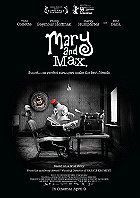 Posted : 10 years, 3 months ago on 20 February 2015 11:49
(A review of Mary and Max)
Posted : 10 years, 3 months ago on 20 February 2015 11:49
(A review of Mary and Max)'Mary and Max' is one of those movies that I WANTED to like a little better than I did. The story is certainly unique; the film spans the 20-year pen-pal friendship between "Mary Daisy Dingle", an 8-year-old girl living in Australia with her alcoholic mother, and Max, a 44-year-old obese man with Asperger's Syndrome living in New York City. One day, at her local library, Mary finds Max's address in an American phone book and casually writes him a letter; after much panicking about how to handle his unexpected mail, Max writes back to Mary, and they continue to correspond off and on for the next two decades.
The film is clay-animated; through both narration and occasional dialogue, it shows us the ups and downs of Mary's and Max's individual lives as well as their friendship. Despite being animated, the movie isn't for young children, as there are some very dark themes; that said, 'Mary and Max' bills itself as a comedy and there are indeed many clever and humorous moments throughout the film (however, this one is definitely a "black" comedy).
The film moves at a fast pace, and I enjoyed the narration and the score. I also liked seeing how these two lonely, outcast characters were able to make a connection through "snail mail". I preferred Mary's character to Max's -- but it was interesting to see *both* of their lives, although the constant "down" moments of each character grew to be a bit much.
I can't pinpoint exactly what didn't work for me in this movie; there was no major issue, just lots of little things here and there. Also, I kind of wish it had ended differently.
Still, 'Mary and Max' isn't a bad movie by any means. (I doubt that I'll watch it again, but I didn't consider it a waste of time, either.) I could see how some viewers might really get something out of it; but, for me, it was just slightly better than okay. (5.5/10)
The film is clay-animated; through both narration and occasional dialogue, it shows us the ups and downs of Mary's and Max's individual lives as well as their friendship. Despite being animated, the movie isn't for young children, as there are some very dark themes; that said, 'Mary and Max' bills itself as a comedy and there are indeed many clever and humorous moments throughout the film (however, this one is definitely a "black" comedy).
The film moves at a fast pace, and I enjoyed the narration and the score. I also liked seeing how these two lonely, outcast characters were able to make a connection through "snail mail". I preferred Mary's character to Max's -- but it was interesting to see *both* of their lives, although the constant "down" moments of each character grew to be a bit much.
I can't pinpoint exactly what didn't work for me in this movie; there was no major issue, just lots of little things here and there. Also, I kind of wish it had ended differently.
Still, 'Mary and Max' isn't a bad movie by any means. (I doubt that I'll watch it again, but I didn't consider it a waste of time, either.) I could see how some viewers might really get something out of it; but, for me, it was just slightly better than okay. (5.5/10)
 0 comments, Reply to this entry
0 comments, Reply to this entry
Not any worse than most other "rom-coms"
 Posted : 10 years, 3 months ago on 20 February 2015 11:45
(A review of Maid in Manhattan)
Posted : 10 years, 3 months ago on 20 February 2015 11:45
(A review of Maid in Manhattan)'Maid in Manhattan' received generally terrible reviews, and understandably so; this is no cinematic treasure. Critics were right to call the movie clichéd, contrived, and predictable. Jennifer Lopez and Ralph Fiennes lack chemistry; and (while not the brattiest I've ever seen) naturally Lopez's character's young son comes off as a little too "cute" and overly precocious.
All of this being said -- I didn't think 'Maid in Manhattan' was THAT bad of a movie. I didn't LOVE it (by any stretch) but I didn't think it was any worse than -- or much different from -- most other romantic comedies of this day and age. (Including many "rom-coms" that received far better reviews.)
Lopez neither charmed nor irritated me (much) as the title character; I rolled my eyes a few times, but for the most part, she was just kind of... meh. As for Fiennes (her character's politician love interest/Prince Charming), for what little personality his character displayed, I... sort of liked him.
I'm probably being a little too generous by giving this one two-and-a-half stars (5/10) -- but for its genre, 'Maid in Manhattan' is fine. Not wonderful by any means, but it passes the time; and I've definitely seen movies that are far worse.
All of this being said -- I didn't think 'Maid in Manhattan' was THAT bad of a movie. I didn't LOVE it (by any stretch) but I didn't think it was any worse than -- or much different from -- most other romantic comedies of this day and age. (Including many "rom-coms" that received far better reviews.)
Lopez neither charmed nor irritated me (much) as the title character; I rolled my eyes a few times, but for the most part, she was just kind of... meh. As for Fiennes (her character's politician love interest/Prince Charming), for what little personality his character displayed, I... sort of liked him.
I'm probably being a little too generous by giving this one two-and-a-half stars (5/10) -- but for its genre, 'Maid in Manhattan' is fine. Not wonderful by any means, but it passes the time; and I've definitely seen movies that are far worse.
 0 comments, Reply to this entry
0 comments, Reply to this entry
A "grittier" Lifetime film (but not entirely bad)
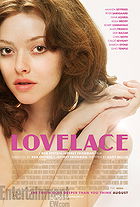 Posted : 10 years, 3 months ago on 20 February 2015 11:43
(A review of Lovelace)
Posted : 10 years, 3 months ago on 20 February 2015 11:43
(A review of Lovelace)Sometimes I watch movies simply because actors that I like are in them; in the case of 'Lovelace', I happened to notice that Peter Sarsgaard was one of the stars, which prompted my decision to stream it on Netflix (I've enjoyed Sarsgaard in other roles, and I hadn't seen him in anything for awhile).
Otherwise, I doubt that a biopic about Linda Lovelace would have ever caught my attention. I've never seen 'Deep Throat' (the porn movie that made her famous, in what was apparently her only significant "role") and certainly don't have any desire to see it. Before watching 'Lovelace', I knew of both 'Deep Throat' and Lovelace herself by name only.
Well, now that I've seen this film, I know a little more about both -- at least, I know the version of Linda Lovelace's life that's presented in 'Lovelace' (which is based on Linda's autobiography "Ordeal". I guess that certain folks have questioned the authenticity of some of the events portrayed in the film; I'm not sure why, and I don't feel that compelled to look into the reasons.)
Most of 'Lovelace' centers on Linda's relationship with her abusive ex-husband, Chuck Traynor. The movie is split into two distinct segments. The first segment shows one account of Linda's life, starting with before she became a porn star -- in this account, we see her strained relationship with her parents, her early relationship with her "boyfriend" Traynor, and finally her experience making 'Deep Throat'. (After Linda marries Traynor, his true colors start to show; he manipulates her into making the porn film, telling her that it will help launch an acting career or somesuch).
If I'm not mistaken, in this first part of 'Lovelace', the "Deep Throat" scenes (and the "glamorous" parties and celebrity status that follow the famed... er, movie's release) are intended to show Linda's life as viewed from the eyes of "the public". Here, we also get a surface glimpse of Traynor -- it's established that he handles Linda's career, and hinted at that he's not the nicest of fellows. However, Traynor is never actually violent toward Linda in this part of the film; mostly, he just comes across as vaguely sleazy and rather controlling. Linda herself seems to more-or-less enjoy her time on 'Deep Throat' and her resulting fame.
It isn't until the second segment of 'Lovelace' that we witness the true extent of Traynor's abuse (with the two different accounts of Linda's ordeal explained via several "flash forward" scenes, in which Linda is seen taking a polygraph test -- where she confirms and elaborates on the abuse by Traynor detailed in her autobiography).
In this second -- and much darker -- half of the film, Traynor beats Linda, frequently holds a gun to her head, forces her into prostitution, and blatantly exploits her fame in various attempts to bring in more money (all for himself).
Linda, for her part, tries on several occasions to flee both Traynor and the porn industry -- but her attempts are futile. Until she finally gets through to an adult film producer (?), who helps her get away (he then gathers some goons to go surprise Traynor with his own beating. Which is shown in a brief scene that's not especially graphic but IS rather bizarre -- maybe because they use a belt, of all things, as their "weapon". I'm not sure if I expected a tire iron or what -- actually, I have ZERO knowledge of how porn-industry beatdowns work -- but the belt just seemed like an odd choice.)
Eventually, in the remaining scenes of 'Lovelace', we see Linda successfully leave the adult film world; it's also established (and, in some cases, briefly shown) that she marries a much nicer man, publishes her autobiography, reconciles with her estranged parents, and, finally, becomes an outspoken anti-porn advocate.
As you might expect, 'Lovelace' is rated 'R'; and it's certainly not a film for children (who I doubt would even be interested). The abuse scenes are pretty intense, and... well, it's a movie about a porn star.
However, for a movie about a porn star, 'Lovelace' doesn't exactly glorify pornography; in fact, the adult film industry is portrayed almost entirely throughout the movie as destructive and negative. On that note, I can easily envision a "cleaned-up" version of this movie airing one day on Lifetime (or some equivalent network geared toward women).
In case you might be wondering who stars in 'Lovelace' (other than Sarsgaard) -- Linda herself is played by Amanda Seyfried. Now, as far as I know, the only other movie that I've seen Seyfried in is 'Mean Girls'; and to give her credit, she's VERY different in this role -- enough so that I might not have even known she was the same actress if I didn't recognize her name. Again, I know next to nothing about the real Linda Lovelace; so I can't say how well Seyfried captures her mannerisms and such. However, I will say that Seyfried does a pretty good job of conveying a naive young woman trapped in an abusive relationship that she desperately wants to escape, but doesn't know how to begin doing so.
As for Sarsgaard -- I wouldn't call this his greatest performance ever; but it's definitely a different sort of role for him than I've seen in prior films. And for the most part, he's very effective. I hadn't heard of Chuck Traynor at all before watching 'Lovelace'; thus (as with Seyfriend's portrayal of Linda) I'm not sure how well Sarsgaard captures the real Traynor. But Sarsgaard convincingly portrays an insecure, bullying, and (above all) pathetic lowlife of an individual; and he's actually pretty scary in the abuse scenes.
Other actors who appear in the film include: Debi Mazar (it was nice to see her again); James Franco as "Hugh Hefner" (fortunately on both counts, his role is minor); Chloe Sevigny (in a blink-and-you'll-miss-it cameo; I did see it, but I didn't recognize Sevigny and didn't catch that it was her until the end credits); and Sharon Stone (whom I BEYOND didn't recognize as Lovelace's mother, so kudos for that -- although, performance-wise, Stone is probably the weakest in the film).
Overall, I'm not really sure how to rate 'Lovelace', although I'm granting it a (somewhat reluctant) two-and-a-half stars (or 5/10). It was more interesting than I expected, and the performances are pretty good; but it's hard to look past the fact that, in the end, 'Lovelace' is basically just a glorified Lifetime movie. (5/10)
Otherwise, I doubt that a biopic about Linda Lovelace would have ever caught my attention. I've never seen 'Deep Throat' (the porn movie that made her famous, in what was apparently her only significant "role") and certainly don't have any desire to see it. Before watching 'Lovelace', I knew of both 'Deep Throat' and Lovelace herself by name only.
Well, now that I've seen this film, I know a little more about both -- at least, I know the version of Linda Lovelace's life that's presented in 'Lovelace' (which is based on Linda's autobiography "Ordeal". I guess that certain folks have questioned the authenticity of some of the events portrayed in the film; I'm not sure why, and I don't feel that compelled to look into the reasons.)
Most of 'Lovelace' centers on Linda's relationship with her abusive ex-husband, Chuck Traynor. The movie is split into two distinct segments. The first segment shows one account of Linda's life, starting with before she became a porn star -- in this account, we see her strained relationship with her parents, her early relationship with her "boyfriend" Traynor, and finally her experience making 'Deep Throat'. (After Linda marries Traynor, his true colors start to show; he manipulates her into making the porn film, telling her that it will help launch an acting career or somesuch).
If I'm not mistaken, in this first part of 'Lovelace', the "Deep Throat" scenes (and the "glamorous" parties and celebrity status that follow the famed... er, movie's release) are intended to show Linda's life as viewed from the eyes of "the public". Here, we also get a surface glimpse of Traynor -- it's established that he handles Linda's career, and hinted at that he's not the nicest of fellows. However, Traynor is never actually violent toward Linda in this part of the film; mostly, he just comes across as vaguely sleazy and rather controlling. Linda herself seems to more-or-less enjoy her time on 'Deep Throat' and her resulting fame.
It isn't until the second segment of 'Lovelace' that we witness the true extent of Traynor's abuse (with the two different accounts of Linda's ordeal explained via several "flash forward" scenes, in which Linda is seen taking a polygraph test -- where she confirms and elaborates on the abuse by Traynor detailed in her autobiography).
In this second -- and much darker -- half of the film, Traynor beats Linda, frequently holds a gun to her head, forces her into prostitution, and blatantly exploits her fame in various attempts to bring in more money (all for himself).
Linda, for her part, tries on several occasions to flee both Traynor and the porn industry -- but her attempts are futile. Until she finally gets through to an adult film producer (?), who helps her get away (he then gathers some goons to go surprise Traynor with his own beating. Which is shown in a brief scene that's not especially graphic but IS rather bizarre -- maybe because they use a belt, of all things, as their "weapon". I'm not sure if I expected a tire iron or what -- actually, I have ZERO knowledge of how porn-industry beatdowns work -- but the belt just seemed like an odd choice.)
Eventually, in the remaining scenes of 'Lovelace', we see Linda successfully leave the adult film world; it's also established (and, in some cases, briefly shown) that she marries a much nicer man, publishes her autobiography, reconciles with her estranged parents, and, finally, becomes an outspoken anti-porn advocate.
As you might expect, 'Lovelace' is rated 'R'; and it's certainly not a film for children (who I doubt would even be interested). The abuse scenes are pretty intense, and... well, it's a movie about a porn star.
However, for a movie about a porn star, 'Lovelace' doesn't exactly glorify pornography; in fact, the adult film industry is portrayed almost entirely throughout the movie as destructive and negative. On that note, I can easily envision a "cleaned-up" version of this movie airing one day on Lifetime (or some equivalent network geared toward women).
In case you might be wondering who stars in 'Lovelace' (other than Sarsgaard) -- Linda herself is played by Amanda Seyfried. Now, as far as I know, the only other movie that I've seen Seyfried in is 'Mean Girls'; and to give her credit, she's VERY different in this role -- enough so that I might not have even known she was the same actress if I didn't recognize her name. Again, I know next to nothing about the real Linda Lovelace; so I can't say how well Seyfried captures her mannerisms and such. However, I will say that Seyfried does a pretty good job of conveying a naive young woman trapped in an abusive relationship that she desperately wants to escape, but doesn't know how to begin doing so.
As for Sarsgaard -- I wouldn't call this his greatest performance ever; but it's definitely a different sort of role for him than I've seen in prior films. And for the most part, he's very effective. I hadn't heard of Chuck Traynor at all before watching 'Lovelace'; thus (as with Seyfriend's portrayal of Linda) I'm not sure how well Sarsgaard captures the real Traynor. But Sarsgaard convincingly portrays an insecure, bullying, and (above all) pathetic lowlife of an individual; and he's actually pretty scary in the abuse scenes.
Other actors who appear in the film include: Debi Mazar (it was nice to see her again); James Franco as "Hugh Hefner" (fortunately on both counts, his role is minor); Chloe Sevigny (in a blink-and-you'll-miss-it cameo; I did see it, but I didn't recognize Sevigny and didn't catch that it was her until the end credits); and Sharon Stone (whom I BEYOND didn't recognize as Lovelace's mother, so kudos for that -- although, performance-wise, Stone is probably the weakest in the film).
Overall, I'm not really sure how to rate 'Lovelace', although I'm granting it a (somewhat reluctant) two-and-a-half stars (or 5/10). It was more interesting than I expected, and the performances are pretty good; but it's hard to look past the fact that, in the end, 'Lovelace' is basically just a glorified Lifetime movie. (5/10)
 0 comments, Reply to this entry
0 comments, Reply to this entry
Late 80's silliness
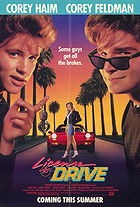 Posted : 10 years, 3 months ago on 20 February 2015 11:42
(A review of License to Drive)
Posted : 10 years, 3 months ago on 20 February 2015 11:42
(A review of License to Drive)I watched this dumb movie ages ago and thought that it was really stupid. Not "good" stupid -- just stupid, stupid.
I watched it again recently on Netflix, and... still thought that it was really stupid. Only this time, it also put me to sleep.
What did I expect from a movie starring both of "the Coreys"? (3/10)
I watched it again recently on Netflix, and... still thought that it was really stupid. Only this time, it also put me to sleep.
What did I expect from a movie starring both of "the Coreys"? (3/10)
 0 comments, Reply to this entry
0 comments, Reply to this entry
I liked it better the second time around
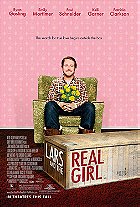 Posted : 10 years, 3 months ago on 20 February 2015 11:40
(A review of Lars and the Real Girl)
Posted : 10 years, 3 months ago on 20 February 2015 11:40
(A review of Lars and the Real Girl)I watched 'Lars and the Real Girl' for the first time in 2013 or 2014 and didn't think much of it. Something prompted me to watch it again, though, in 2015; I believe it was a review I happened to read that noted that the film portrays Lars's Christian church in a positive manner. Since that's a rare thing in most movies these days -- even though I couldn't remember any church scenes from my first viewing, the comment (and a few other positive elements mentioned in the review) made me think, why not give this one another shot?
So I did. And upon watching a second time, I discovered that -- for having such a STUPID-sounding premise (a man touts around a *sex doll* and calls it his girlfriend? really?!) 'Lars and the Real Girl' turned out to be a fairly interesting and surprisingly gentle film.
Ryan Gosling stars in the movie as Lars -- a shy, socially awkward man in his late 20's who lives in the garage adjacent to his brother and sister-in-law's house in Somewhere, Wisconsin (the movie was actually filmed in Ontario).
One day, after Lars's co-worker shows him a website for "real dolls" (read: blow-up sex dolls), Lars orders one for himself (offscreen). After the doll arrives, Lars happily introduces his new girlfriend "Bianca" to his brother and sister-in-law, Gus and Karen. At first, Gus and Karen are excited to hear that Lars "met somebody"; but naturally, (though they don't mention it to Lars) Gus and Karen are horrified to see that "Bianca" is really just some sex doll. They're even more horrified to hear Lars speaking sincerely of Bianca -- and TO Bianca -- as though she's an actual, living and breathing person.
Nevertheless, Gus and Karen awkwardly play along with the scenario. Under the guise of giving Bianca a "check-up", they take Lars and Bianca to see Dagmar (Patricia Clarkson), their family doctor who just happens to also be a psychologist. At the doctor's office, Dagmar privately encourages Gus and Karen to KEEP treating Bianca as though she's a real person -- explaining this to them as some sort of therapy for Lars. Dagmar then instructs Lars to bring Bianca in to her office a few times each week for treatment for her "low blood pressure"; Dagmar plans to use Bianca's "treatment" time to talk with Lars and try to figure out the underlying cause of his delusion.
Gus, Karen, Lars, and "Bianca" agree to all of this -- though Gus in particular shows some reservation. Still, Gus and Karen quietly fill some of the residents of their (one-horse) town in on the situation; and before long, seemingly the entire town has welcomed Bianca with open arms! Including Margo -- the real (human) girl who works with Lars, and who eventually plays an important role in his (and Bianca's) outcome.
The movie still sounds really stupid described in detail, I know. However, strangely enough... it kind of works. There's nothing mean-spirited about the story; and (other than the fact that Bianca's for whatever reason a blow-up doll) nothing else crude or cheap-humored in the script (there are hardly even any references to sex, aside from a few very mild jokes). The film doesn't make fun of Lars, nor (for the most part) does he come across as a saintly "Gary Stu".
As for portraying Lars's church in a positive manner -- indeed, there are several scenes where Lars, Gus, Karen, Margo, and even "Bianca" attend a Lutheran church (and one scene where the pastor and some church members visit Gus and Karen at home). Most of these scenes are pretty brief (which is probably why they didn't stick with me after the first time I watched the film); but, yes, Lars's pastor and fellow church members come across as likable and support Lars 100% just like the other folks in his town (and, yes, it's a nice change of pace to see a church in an otherwise secular movie depicted as just a positive part of the characters' day-to-day lives, rather than filled with "foolish" or "evil" religious stereotypes).
So, why did I give 'Lars and the Real Girl' only 3 stars? Although I did like it a lot better the second time that I watched it, my main problem with the movie is that it simply requires too much suspension of disbelief. Some viewers might not mind this; and even I was willing to suspend my disbelief to an extent.
For example, on the one hand, I could easily buy that the townsfolk felt compassionate toward Lars (no disbelief there); I also accepted that they wouldn't feel bothered by Lars carting Bianca around town everywhere he went (it was a bit more of a stretch to believe that so many of Lars's neighbors would be so eager to *also* tote her around -- or "take her out" to "volunteer" or whatever they claimed to be doing. But the townspeople all seemed to like Gus, Karen, and Lars -- and it WAS a small town, and perhaps they welcomed the change in routine -- so this eagerness to "help" with Bianca wasn't outright impossible to swallow.)
On the other hand -- the "hospital" scene and the location of the final scene just felt like a bit TOO much. Um, those places would cost a lot of money (as would the appointments with Dagmar -- though Dagmar at least used her appointments with "Bianca" as a cover for providing therapy for Lars). Were Gus and Karen secretly millionaires? And what about the real people who might actually *need* the services that were provided for Bianca?
Aside from the "suspension of disbelief" issue, there are a handful of moments in 'Lars' that are borderline cutesy/overly sentimental -- particularly the scenes with Margo (I didn't mind her character per se, but she WAS kind of cutesy at times). Karen's pregnancy also felt a bit contrived (though, for all I know, Emily Mortimer was pregnant in real life. But since the character's obvious pregnancy is barely touched on, I was prepared for some cringe-worthy "wacky pregnant lady" scenes -- or for some speech about how the new baby symbolized the miracle of life. Fortunately, these moments never came.) Still, despite the occasional giggly moment from Margo -- or crooning serenade from Lars -- the movie at least manages to avoid total schmaltz overload.
Regarding the cast: no offense to Ryan Gosling, but I wouldn't have minded if somebody else had played Lars; that said, he does a fine job with the role. I wasn't familiar with most of the other actors -- however, they all give respectable performances, including Mortimer (although she sounded like she needed a lozenge in the outdoor scene where Karen argues with Lars) and the always-reliable Clarkson.
One actor I WAS familiar with prior to watching 'Lars' (and pleasantly surprised to see pop up in a minor-yet-significant role as a co-worker who briefly dates Margo) is Billy Parrott; those who watched "Degrassi Junior High" might remember him as "Shane McKay" on that classic Canadian show.
Ultimately, even with its flaws, 'Lars and the Real Girl' is still worth a watch for anybody who prefers quirky, character-driven stories about small town-life to movies filled with nothing but crude bathroom humor or nonstop action. (6/10)
So I did. And upon watching a second time, I discovered that -- for having such a STUPID-sounding premise (a man touts around a *sex doll* and calls it his girlfriend? really?!) 'Lars and the Real Girl' turned out to be a fairly interesting and surprisingly gentle film.
Ryan Gosling stars in the movie as Lars -- a shy, socially awkward man in his late 20's who lives in the garage adjacent to his brother and sister-in-law's house in Somewhere, Wisconsin (the movie was actually filmed in Ontario).
One day, after Lars's co-worker shows him a website for "real dolls" (read: blow-up sex dolls), Lars orders one for himself (offscreen). After the doll arrives, Lars happily introduces his new girlfriend "Bianca" to his brother and sister-in-law, Gus and Karen. At first, Gus and Karen are excited to hear that Lars "met somebody"; but naturally, (though they don't mention it to Lars) Gus and Karen are horrified to see that "Bianca" is really just some sex doll. They're even more horrified to hear Lars speaking sincerely of Bianca -- and TO Bianca -- as though she's an actual, living and breathing person.
Nevertheless, Gus and Karen awkwardly play along with the scenario. Under the guise of giving Bianca a "check-up", they take Lars and Bianca to see Dagmar (Patricia Clarkson), their family doctor who just happens to also be a psychologist. At the doctor's office, Dagmar privately encourages Gus and Karen to KEEP treating Bianca as though she's a real person -- explaining this to them as some sort of therapy for Lars. Dagmar then instructs Lars to bring Bianca in to her office a few times each week for treatment for her "low blood pressure"; Dagmar plans to use Bianca's "treatment" time to talk with Lars and try to figure out the underlying cause of his delusion.
Gus, Karen, Lars, and "Bianca" agree to all of this -- though Gus in particular shows some reservation. Still, Gus and Karen quietly fill some of the residents of their (one-horse) town in on the situation; and before long, seemingly the entire town has welcomed Bianca with open arms! Including Margo -- the real (human) girl who works with Lars, and who eventually plays an important role in his (and Bianca's) outcome.
The movie still sounds really stupid described in detail, I know. However, strangely enough... it kind of works. There's nothing mean-spirited about the story; and (other than the fact that Bianca's for whatever reason a blow-up doll) nothing else crude or cheap-humored in the script (there are hardly even any references to sex, aside from a few very mild jokes). The film doesn't make fun of Lars, nor (for the most part) does he come across as a saintly "Gary Stu".
As for portraying Lars's church in a positive manner -- indeed, there are several scenes where Lars, Gus, Karen, Margo, and even "Bianca" attend a Lutheran church (and one scene where the pastor and some church members visit Gus and Karen at home). Most of these scenes are pretty brief (which is probably why they didn't stick with me after the first time I watched the film); but, yes, Lars's pastor and fellow church members come across as likable and support Lars 100% just like the other folks in his town (and, yes, it's a nice change of pace to see a church in an otherwise secular movie depicted as just a positive part of the characters' day-to-day lives, rather than filled with "foolish" or "evil" religious stereotypes).
So, why did I give 'Lars and the Real Girl' only 3 stars? Although I did like it a lot better the second time that I watched it, my main problem with the movie is that it simply requires too much suspension of disbelief. Some viewers might not mind this; and even I was willing to suspend my disbelief to an extent.
For example, on the one hand, I could easily buy that the townsfolk felt compassionate toward Lars (no disbelief there); I also accepted that they wouldn't feel bothered by Lars carting Bianca around town everywhere he went (it was a bit more of a stretch to believe that so many of Lars's neighbors would be so eager to *also* tote her around -- or "take her out" to "volunteer" or whatever they claimed to be doing. But the townspeople all seemed to like Gus, Karen, and Lars -- and it WAS a small town, and perhaps they welcomed the change in routine -- so this eagerness to "help" with Bianca wasn't outright impossible to swallow.)
On the other hand -- the "hospital" scene and the location of the final scene just felt like a bit TOO much. Um, those places would cost a lot of money (as would the appointments with Dagmar -- though Dagmar at least used her appointments with "Bianca" as a cover for providing therapy for Lars). Were Gus and Karen secretly millionaires? And what about the real people who might actually *need* the services that were provided for Bianca?
Aside from the "suspension of disbelief" issue, there are a handful of moments in 'Lars' that are borderline cutesy/overly sentimental -- particularly the scenes with Margo (I didn't mind her character per se, but she WAS kind of cutesy at times). Karen's pregnancy also felt a bit contrived (though, for all I know, Emily Mortimer was pregnant in real life. But since the character's obvious pregnancy is barely touched on, I was prepared for some cringe-worthy "wacky pregnant lady" scenes -- or for some speech about how the new baby symbolized the miracle of life. Fortunately, these moments never came.) Still, despite the occasional giggly moment from Margo -- or crooning serenade from Lars -- the movie at least manages to avoid total schmaltz overload.
Regarding the cast: no offense to Ryan Gosling, but I wouldn't have minded if somebody else had played Lars; that said, he does a fine job with the role. I wasn't familiar with most of the other actors -- however, they all give respectable performances, including Mortimer (although she sounded like she needed a lozenge in the outdoor scene where Karen argues with Lars) and the always-reliable Clarkson.
One actor I WAS familiar with prior to watching 'Lars' (and pleasantly surprised to see pop up in a minor-yet-significant role as a co-worker who briefly dates Margo) is Billy Parrott; those who watched "Degrassi Junior High" might remember him as "Shane McKay" on that classic Canadian show.
Ultimately, even with its flaws, 'Lars and the Real Girl' is still worth a watch for anybody who prefers quirky, character-driven stories about small town-life to movies filled with nothing but crude bathroom humor or nonstop action. (6/10)
 0 comments, Reply to this entry
0 comments, Reply to this entry
 Login
Login
 Home
Home 13 Lists
13 Lists 45 Reviews
45 Reviews Collections
Collections